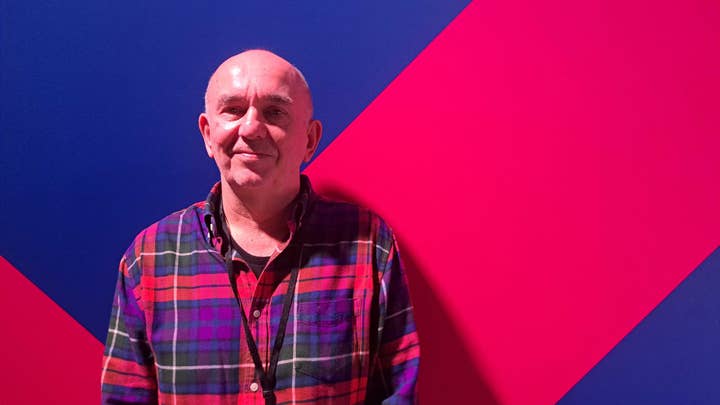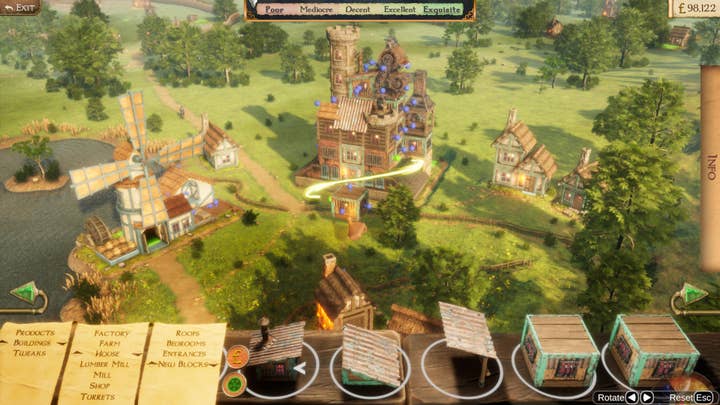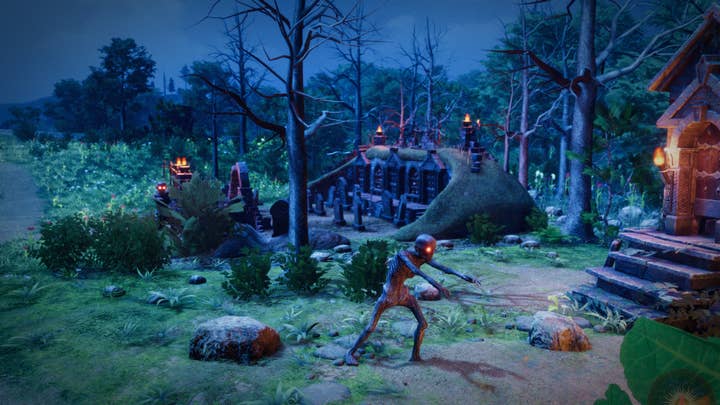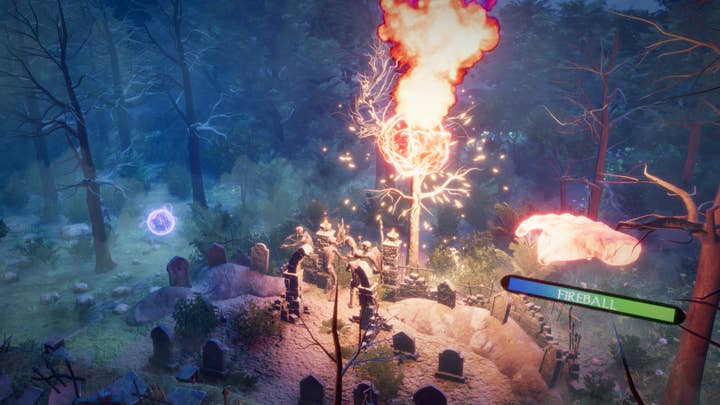Masters of Albion is Peter Molyneux's final shot at redemption (probably)
The game designer on his return to PC and console, his quest for an Edge 10, reuniting with old friends and why this is likely his final game
Opinions on Peter Molyneux vary.
For some, he's a whimsical raconteur responsible for some of the most inspirational games in this industry.
For others, he's someone who wilfully misleads fans and has somewhat sullied his reputation with ill-advised pivots into motion controls, Kickstarter and NFTs.
But if there's one thing we can all agree on, it's that Peter Molyneux has made some great games. Right?
"I've never made a great game,” Molyneux insists.

"I feel ultimately guilty because I am just a member of a team. I’m just the frontman. The people that we’ve got here, Gary and Anna and Thomas and Tom… they are putting slices of their lives into this game. And it’s my direction that I’ve given them. So for the game not to be… I’ve never got an Edge 10/10. I know that may seem trivial. But to have worked with such incredibly talented people and not to make something great… it just drives me on."
No matter what the critics at Edge might think (Dungeon Keeper, Black & White and Fable 2 all scored 9/10, for the record), you can’t move in this industry without running into someone who was inspired to get into games because of what Molyneux’s teams created at Bullfrog and Lionhead. That’s an impact other creators could only dream of.
"I am honoured to have been part of people’s lives," Molyneux says. "But that’s not my definition of greatness. And without that drive [for greatness], I don’t think I’d be here sitting opposite you now at 65."
The reason Molyneux is sitting opposite me is to discuss what might be his final game: Masters of Albion. By the time you’re reading this the trailer would have been shown on stage at Gamescom. And after more than a decade making (primarily) mobile games at his studio 22Cans, Molyneux is - as he told GamesIndustry.biz last year - returning to PC and console.

"I started to realise there was a formula with free-to-play games," he explains. "And if you adhere to that formula then your game will monetise well, but if you try to go off that formula, then your game will do less well.
"So for purely personal reasons, I got disillusioned with mobile. And I started to ask… what should I focus on? I was 60 at the time and this realisation came to me that this next game could be my last. I am not announcing I’m retiring. I’ll be found dead one morning with my head pressed against the keyboard. But I’ll be in my late 60s when this game is finished, and if I start another one, I'll be in my mid-70s. My life expectancy is measured in days rather than years because of my lifestyle. I smoke and drink and don’t sleep enough.
"So if this is going to be my last game, what should it be? And the first thing that occurred to me is that I wanted to go home. I wanted to come back to PC and console, and make a game for gamers."
This notion of 'going home' extends to what Molyneux is trying to do with Masters of Albion. It is a fantasy god game where players build up a town that gets attacked at night, and the designer is revisiting features and concepts from some of his most famous games. There’s the 'defender' gameplay and the ability to possess characters from Dungeon Keeper, the open world and morality system of Black & White, and the humour, world and quest system of Fable.
"In Dungeon Keeper, we invented the possession mode but never exploited it, never explored it,” he explains. "This is why a lot of Nintendo games are great, because they are fantastic at coming up with a unique mechanic and exploiting it in a way that's just delightful.
"This is me maturing as a designer, and realising that every time that I make a game, it doesn’t need to be a total blank sheet of paper."
"I’ve never got an Edge 10/10. I know that may seem trivial. But to have worked with such incredibly talented people and not to make something great… it just drives me on."
The final part of this 'going home' is in the 20-person team Molyneux has built to make the game. He has augmented 22Cans with some famous names from Bullfrog and Lionhead history. This includes composer and sound engineer Russell Shaw, game designer Iain Wright, plus artists and creative leaders Mark Healey and Kareem Ettouney. The latter two are best known today as the co-founders of LittleBigPlanet developer Media Molecule.
“It’s like getting the band back together one more time,” Molyneux says.
"The person that is missing is our art director Paul McLaughlin who sadly passed away, and he continues to be missed everyday. And there are some other band members I’d love to work with again. Like Simon and Dene Carter… I’d love to work with Alex Evans. But their lives are too complex to come back."
So Molyneux is returning to the type of game he’s best known for, he’s revisiting the classics and has reunited with some of Bullfrog and Lionhead’s most famous faces. It sounds exciting and yet he is noticeably anxious, vaping throughout our interview and getting tearful on more than one occasion.
The events of ten years ago – where the messy launch of Godus and its poorly executed Kickstarter campaign resulted in one Rock Paper Shotgun journalist asking Molyneux if he's "a pathological liar" – saw him retreat from public view. And now, following a casual lunch with Gamescom Opening Night Live organiser Geoff Keighley, he finds himself in front of the media once again.
"What happened in the press was, for me, terrible," he admits. "I developed a whole load of stress-related conditions that are forever life-changing. I wear my heart on my sleeve, and so going back to doing the press and sticking my head above the parapet… only the confidence I have in the game has given me the ability to do that. It’s terrifying to say to the world: 'Judge me on this game. Don’t judge me on a promise that has yet to be implemented'."
He adds: "There will be more [media] distractions in the future, that’s inevitable. But I want to retreat a bit more. I used to just say 'yes' to everything. I don’t ever want to go back to being a spokesman."

We’ve spent a lot of time talking about the influence of Bullfrog and Lionhead's games on Masters of Albion, but what about 22Cans titles? Molyneux tells us that the crafting system from [2016 mobile game] The Trail was an influence, as was the city building mechanics they were working on in an ill-fated NFT project called Legacy.
Legacy had another major impact on Masters of Albion. Despite failing to deliver ("Unfortunately, crypto games have been a bit of a deadend for the games industry," Molyneux explains), it made huge sums of money via the sale of in-game land, and it’s this money that has been used to fund Masters of Albion.
There will be strong views on using money raised for one project to build another, but the outcome is that Masters of Albion is entirely self-funded. And there is currently no publisher involved. Yet 22Cans is not entirely alone. Molyneux has recruited John Clark, a games publishing veteran who has worked at Eidos, Sega, Tencent, and was most recently CEO of Curve, to help find a partner that can take Masters of Albion to market.
"If we were stuck in time, still doing box copies and the only way to communicate with our audience was through magazines… well, I’d feel okay with doing that," Molyneux says. "But the world has moved on. You have to do a stellar job of community and deeply understand Steam and the platforms. And to do that, you have to hire a lot of people, which would dilute the team here. We just don’t have the skills to get this game to market."
He continues: "In some ways I’d love to go back to the world where you have E3 and you sit in a little hot room and show 60 journalists a day what you’re working on and getting them excited. That was a fantastic time, but that’s gone. The world doesn’t need that anymore. It needs a depth and rationale and reason behind the game that you’re making."
Clark believes that Masters of Albion ticks a lot of boxes for publishers. And he has a history with these games. During his time at Sega, he signed Two Point Hospital, a game also created by former Lionhead and Bullfrog luminaries at Two Point Studios.
"I asked myself, if this came to me, would I sign it? And the answer was yes," he said.
Molyneux laughs: "And I gave the worst demo. We were sitting here and I said I’d show him the game and hopefully it will convince... And nothing worked."
"People are going to be sceptical. So when I release this into Early Access, or if we have a close Beta… it has to be fucking amazing. I know it does."
Molyneux's 'gut instinct' is that Masters of Albion will launch in Early Access, and this gave me pause. With Early Access, gamers need to trust that the team will continue to update and complete the project. And trust is not something gamers necessarily have in Molyneux, with even recent projects such as Godus Wars and Legacy failing to deliver and being quickly abandoned.
"This is a big bet. And people are going to be sceptical,” Molyneux acknowledges. "So when I release this game into Early Access, or if we have a close Beta or something… it has to be fucking amazing. I know it does."
He adds: "My interpretation of Early Access ten years ago was that you’ve got something that vaguely works, it’s not playable from start to finish, but you put it out there and you get feedback and continue to develop the game in the crazy way that I develop. Which is, literally, trying a feature, failing, throwing it away, trying another… that’s not what Early Access is.
"Firstly, the game has to be playable from start to finish. People are investing money and time and their expectation is that they are going to get a whole experience, not a section. Secondly, Early Access can’t be a platform to fix bugs. You can't think 'well we don’t need to employ any testers, we can just use Early Access'. There might be a few issues that people discover because of the routes they take, but generally speaking, it's a non-buggy game.
"What can be missing, and I might be wrong, is if you’ve got cut scenes, you can have placeholders. If you've got dialogue, you can have placeholder dialogue… you don’t have to employ famous actors for Early Access, you can add that stuff in.
"But my thought is we should have Early Access. Because the feedback that you get from a vision that is tight enough that people understand it… that can be valuable. If you Early Access where the game and vision isn’t compete, then the feedback that you’re going to get will be so diverse that it will be like designing by committee. I think Early Access is part of the development flow, but it has to be treated unbelievably responsibly."

When Molyneux decided to retreat from view and return to coding, he did so with the belief that the answer to all the criticism was to just make a great game. So does he view Masters of Albion as his shot at redemption?
"The solution to those problems is a great game. So to a certain extent, it is," he says. "Probably at the start, when I was thinking about the game, [redemption] was a powerful force, but that has dwindled. Really it’s about making a great game for a great game’s sake."
It's clear that the dream with Masters of Albion is that it’s Molyneux’s one 'great' game, his redemption and the recipient of that elusive Edge 10/10. A Rocky-style Hollywood ending to his career.
But if it’s not? Well, then it's Molyneux getting to make the game he wants, on his terms, with his old friends by his side. And whatever I say, or Edge says, or Rock Paper Shotgun says, I hope he sees that for the success it so clearly is.

